|
Progressive Men of
Minnesota
Minneapolis Journal
1897
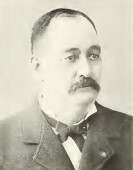 DWIGHT MAJOR BALDWIN is one of the oldest and most
substantial citizens of Red Wing, Minnesota. He is a transplanted
Yankee of the type which has given the Northwest so many
excellent businessmen. Hart B. Baldwin, Mr. Dwight M.
Baldwin’s father, was born at Woodbridge, Connecticut, on
April 15, 1814. He was married to Miss Rebecca Barnum on May
6, 1835. She was a native of Bethel, Connecticut, and a cousin
of Phineas T. Barnum, the famous showman. Mr. Baldwin still
lives at Red Wing, a retired businessman, and “well fixed”
financially. Mrs.
Baldwin died January 5, 1870, at Red Wing. Their son Dwight
was born at Woodbridge, Connecticut, on August 26, 1836. DWIGHT MAJOR BALDWIN is one of the oldest and most
substantial citizens of Red Wing, Minnesota. He is a transplanted
Yankee of the type which has given the Northwest so many
excellent businessmen. Hart B. Baldwin, Mr. Dwight M.
Baldwin’s father, was born at Woodbridge, Connecticut, on
April 15, 1814. He was married to Miss Rebecca Barnum on May
6, 1835. She was a native of Bethel, Connecticut, and a cousin
of Phineas T. Barnum, the famous showman. Mr. Baldwin still
lives at Red Wing, a retired businessman, and “well fixed”
financially. Mrs.
Baldwin died January 5, 1870, at Red Wing. Their son Dwight
was born at Woodbridge, Connecticut, on August 26, 1836.
He was the oldest of six children, five sons and
one daughter. Two of his brothers are still living. Young
Dwight finished his school days at the “Connecticut Literary
Institution” at Suffield in 1853. He learned the carpenter’s
and joiner’s trade with his father, then a contractor and
builder, and at the lighter work could keep up with the most
of the men then he was only fourteen years old. At eighteen he
was a full fledged journeyman, working at the business in New
York City. Later he went to Danbury, Connecticut, and clerked
in his father-in-law’s grocery store.
In April. 1862 he moved to Red Wing, bringing
with him the young wife, whom he had wedded at Danbury on
October 30, 1860, and their first child. Mrs. Baldwin was Miss
Susan Holmes, of Danbury. Upon his arrival in Minnesota Mr.
Baldwin became warehouse clerk for Sheldon and Hodgman. His
next employment was that of steamboat clerk for the old
“Davidson” line between St. Paul and La Crosse. After several
years of river life, he went into partnership with his brother
George W. in the drug and grocery business, but was not
altogether successful.
He then turned his attention to insurance and
real estate business and still has an office in the same line,
having built up a competence, and become interested in many of
the business enterprises of Red Wing. Mr. Baldwin is president
of the North Star Stoneware Company and Vice-President of the
Union Stoneware Company, of Red Wing. Mr. Baldwin was not
engaged in the War of the Rebellion, but was commissioned by
Gov. Ramsey, Captain of Company A, Tenth regiment, Minnesota
State Militia, organized under the act of the special session
of the legislature convened in 1862-3. The company was fully
armed and equipped and was ready for service, but was never
called out. A Democrat on general principles, Mr. Baldwin is
at the same time a “sound money” man.
His religious affiliations are with the
Episcopal church. He is very prominent in the Masonic order,
and is a member of Red Wing Lodge, No. 8, A. F. & A. M.;
La Grange Chapter, No. 4, R. A. M.; Tyrian Council, No. 4, R.
& S. M.; Red Wing Commandery, No. 10, K. T.; Red Wing
Chapter, No. 88, O. E. S., and Osman Temple, A. A. O. N. M.
S., of St. Paul. He is a past officer in all these divisions
of the order and has been representative in its highest
councils.
Mr. and Mrs. Baldwin have had six children,
three of whom are living. Mrs. Mary Estelle Fuller was born at
Danbury, December 31, 1861, and is now living in
Minneapolis.
Dwight Major Baldwin, Jr., was born at Red Wing on May
28, 1867. He is a resident of Minneapolis, and is proprietor
of the “Dwight Flour Mills” at Graceville, Minnesota, and is
doing a very successful business. He was married on September
18, 1889, to Miss Edith E. Sheehan, at Fargo, North Dakota,
and they have two children, Rose Estelle and Dwight Major
111. Alfred
Holmes Baldwin, born at Red Wing. February 17, 1877, is now
living at home.
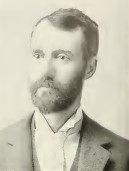 TAMS BIXBY, is an excellent example of a self-made
man, and an instance where the making reflects credit upon the
maker. Mr. Bixby is a resident of Red Wing. He was born
December 2, 1856, at Staunton, Virginia, and is a son of
Bradford W. and Susan Jane Bixby. His parents were poor and
Tams commenced a career, which has proved to be a very
successful one, unaided by personal fortune or by influential
friends. It was in the fall of 1837 that his parents came to
Minnesota and settled at Red Wing. As soon as he was old
enough he was sent to the parish school there, and continued
his attendance until he was thirteen years of age. Beyond that
his educational advantages have been such as an active mind
can derive from the educational facilities which it creates
for itself, through reading, experience and observation. TAMS BIXBY, is an excellent example of a self-made
man, and an instance where the making reflects credit upon the
maker. Mr. Bixby is a resident of Red Wing. He was born
December 2, 1856, at Staunton, Virginia, and is a son of
Bradford W. and Susan Jane Bixby. His parents were poor and
Tams commenced a career, which has proved to be a very
successful one, unaided by personal fortune or by influential
friends. It was in the fall of 1837 that his parents came to
Minnesota and settled at Red Wing. As soon as he was old
enough he was sent to the parish school there, and continued
his attendance until he was thirteen years of age. Beyond that
his educational advantages have been such as an active mind
can derive from the educational facilities which it creates
for itself, through reading, experience and observation.
Possessed of a remarkable degree of energy and
enterprise, he was not slow to employ his business talents in
whatever honorable enterprise promised profitable returns. The
result has been that he has been engaged in the business of
news agent, hotel keeper, baker, broker, and is now editor and
publisher of one of the most flourishing dailies of Minnesota,
the Red Wing Republican. His editorial duties, however, are
only incidental to his more important duties as private
secretary of Gov. Clough. By dint of
perseverance, superior business ability and energy he has
become connected with a number of important concerns in this
and adjoining states. Among other things his present business
connections have brought him the position of president of the
Red Wing Printing Company, president of the Pierre, South
Dakota, Water, Light and Power Company, and vice-president of
the West Duluth Light and Water Company.
Mr. Bixby has a genius for politics, and has
had, of late years, superior opportunities for the development
of his ability in that field. He began his career in politics
as chairman of the Republican county committee of Goodhue
County. His excellent work in that capacity attracted the
attention of Republicans in other parts of the state to him,
and when the Republican League of Minnesota was organized he
was made secretary of that organization. Subsequently he
filled the position of secretary of the Republican State
Central Committee, from which responsible position he was
promoted to that of chairman. In that capacity he has
conducted several important campaigns with signal success, and
established for himself the reputation of being one of the
most skillful and adroit politicians in the state. At the same
time he has added to his list of acquaintances many warm
friends, who have come to appreciate his ability and devotion
to the public interest. In the way of political office the
only positions Mr. Bixby has ever held are those of secretary
of the railroad and warehouse commission in the early days of
that body, and later the office of private secretary to Gov.
Merriam during the two terms in which he occupied the office
of chief executive; also to Gov. Nelson, Gov. Merriam’s
successor, and at this writing he occupies the same relation
to Gov. Clough, who succeeded Gov. Nelson. Mr. Bixby has
sustained his confidential and important relation to the chief
executive of the state for a period of eight years, and has
made himself invaluable to the occupant of that office. He
possesses rare qualities of sociability and geniality, and
attaches men to himself in warm friendship.
He is a member of the Commercial Club at
Red Wing, the Commercial Club of St. Paul; is a Mason and
Knight Templar, and is also a member of the I. O. O. F. He was
married April 27th, 1886, to Clara Mues, and has three sons,
Edson K., born April 9th. 1887: Joel H., born November 3oth,
1888, and Tams, Jr. born September 12th,
1891.
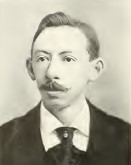 JENS KRISTIAN GRONDAHL enjoys the distinction of
being one of the youngest men in the state to serve in the
legislature. He was elected in 1894 when but twenty-five years
of age. He is a newspaper man and a resident of Red Wing,
where he came with his parents from Norway in 1882. JENS KRISTIAN GRONDAHL enjoys the distinction of
being one of the youngest men in the state to serve in the
legislature. He was elected in 1894 when but twenty-five years
of age. He is a newspaper man and a resident of Red Wing,
where he came with his parents from Norway in 1882.
His father, Lars Grondahl, was a farmer of
limited means but with advanced ideas as to the education and
training of his children, a man of warm heart and generous
disposition. Mr.
Grondahl died in 1895 at the age of seventy-two. His wife, whose maiden
name was Martha Margrete Julsrud, is still living aged
sixty-seven. She
is a woman of most estimable character. Their son Jens was
born at Eidsvold, near Christiania Norway, on December 3,
1869.
He attended the public schools at the place of
his birth and, after coming to America, at the age of
thirteen, at Red Wing. He graduated from the Red Wing Seminary
in 1887 with high honors. Later he attended the University of
Minnesota for one year. Shortly before graduating from the
seminary in 1887 he won the oratorical prize of fifteen
dollars. This, rather oddly, led him into the newspaper
business. He invested the money in the confectionery business,
starting a tiny shop, where be soon accumulated enough debts
to last him for several years. To mend the failing fortunes of
his enterprise he carried papers and later acted as
correspondent for some of the city dailies. When the “Red Wing
Daily Independent” was started in 1891 he was engaged to
conduct the paper—a post which proved to consist in preparing
all the local and editorial “copy,’” distributing it among
three printing offices, and, after the matter was set up,
collecting the type and carrying it to the office where the
paper was printed. Occasionally these manifold duties were
supplemented by the light work of running off the edition on
the cylinder press and delivering the paper to the waiting
subscribers. During the summer of this year Mr. Grondahl made
a brief excursion into the lecture field, assuming the role of
humorous lecturer—an experience which he now looks back upon
as one of the most humorous in his career, whatever the public
may have thought about it. A one-night stand, and an audience
of one, discouraged the budding lecturer, and he has since
devoted himself to journalism and politics.
The campaign of 1892 found Mr. Grondahl an
active worker in the Republican ranks. Two years later he was
a candidate for the legislature to represent Goodhue County in
the lower house. A bitter campaign against the “boy” candidate
ended in his election by a large majority. During the
succeeding session he took an active part in the affairs of
the house and made some very effective speeches on prison
labor reform, the training school bills and other measures
which he regarded especially worthy of support or
denunciation. He was also successful in securing various
important legislation for the benefit of his own county. He
was one of two men who were present at every session of the
legislature. With this record behind him, Mr. Grondahl went
into the representative convention in 1896 and received the
re-nomination by acclamation. In 1892 he became connected with
the “Red Wing Daily Republican,” and in 1894 assumed charge of
“Nordstjernen,” a Norwegian weekly which was then started by
the same company. In the spring of 1896 he was elected
secretary of the Minnesota Republican Editorial Association.
Mr. Grondahl has taken an active part in the Republican state
conventions for the past two years. He was chosen as one of
the delegates to represent Minnesota in the national
convention of Republican clubs at Milwaukee, in August 1896.
Mr. Grondahl is unmarried. He is a
Lutheran.
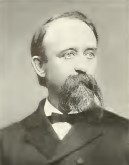 LUCIUS FREDERICK HUBBARD. Hubbard County,
Minnesota, is named after the man who for two successive terms
filled the office of governor with distinguished ability. This man was Lucius
Frederick Hubbard, of Red Wing, who was born January 26, 1836,
at Troy, New York, the eldest son of Charles F. Hubbard and Margeret Van Valkenberg (Hubbard.) At the
time of his father’s death Lucius was but three years of age,
and was sent to live with an aunt at Chester, Vermont, where
he remained until twelve years of age, when he was placed at
school at the academy at Granville, New York, for three years.
At the age of fifteen he went to Poultney, Vermont, and began
an apprenticeship to the tinner’s trade, subsequently
completing his apprenticeship at Salem, New York, in 1854. LUCIUS FREDERICK HUBBARD. Hubbard County,
Minnesota, is named after the man who for two successive terms
filled the office of governor with distinguished ability. This man was Lucius
Frederick Hubbard, of Red Wing, who was born January 26, 1836,
at Troy, New York, the eldest son of Charles F. Hubbard and Margeret Van Valkenberg (Hubbard.) At the
time of his father’s death Lucius was but three years of age,
and was sent to live with an aunt at Chester, Vermont, where
he remained until twelve years of age, when he was placed at
school at the academy at Granville, New York, for three years.
At the age of fifteen he went to Poultney, Vermont, and began
an apprenticeship to the tinner’s trade, subsequently
completing his apprenticeship at Salem, New York, in 1854.
Then, a young man of eighteen years of age, he
resolved to go West, and moved to Chicago, where he worked at
his trade for three years. With the exception of the school
facilities already described he was self educated. Having literary tastes
and studious habits he devoted all his spare time to
systematic and careful study in reading, and in this way
acquired an excellent practical education. In July, 1857, Mr.
Hubbard came to Minnesota and located at Red Wing. Although
without experience in the publishing business, he started the
Red Wing Republican, the second paper in Goodhue County, and
by reason of his energy, perseverance and good practical
judgment made the paper a success from the start. In 1858 he
was chosen by the people of Goodhue County as Register of
Deeds.
In 1861 he became the Republican candidate for
the state senate, but was defeated. In the meantime the War of
the Rebellion had broken out and Mr. Hubbard was just the kind
of a man to feel the responsibility and obligation resting
upon him of service to his country. In December, 1861, he sold
his paper and enlisted as a private in Company A, Fifth
Minnesota, and on the fifth of the following February was
elected captain. The regiment was organized March 20, 1862,
when Mr. Hubbard was advanced to the rank of lieutenant
colonel. The following May it was divided, three companies
being ordered to the Minnesota frontier, the other seven to
the South. Mr.
Hubbard went with the division sent South, and four days after
its arrival at its destination was engaged in the battle of
Farmington, Mississippi, then in the first battle of Corinth,
where Col. Hubbard was severely wounded. In August, 1862, he
became colonel of full rank. He was in command of the regiment
at the battle of luka, at the second battle of Corinth, and at
the battles of Jackson, Mississippi Springs, Mechanicsburg and
Satartia, Mississippi; Richmond, Louisiana; and the assault
and siege of Vicksburg. After the fall of Vicksburg, Col.
Hubbard was given command of the Second brigade, first
division.
Sixteenth Army Corps, within a very short time the
brigade had been in seven battles on Red River in Louisiana
and in Southern Arkansas. On returning to
Memphis, Col. Hubbard’s command took part in several
engagements in the northern part of Mississippi, Arkansas and
Missouri, encountering Gen. Price. Col. Hubbard, with his
brigade, was ordered to reinforce Gen. Thomas at Nashville,
and was engaged in the battle of Nashville, December 15, and
16, 1864. Here the brigade was badly cut to pieces, Col.
Hubbard having two horses killed under him, and being severely
wounded. The brigade, which had long enjoyed a well-earned
reputation under its gallant commander for endurance and
bravery, on this occasion added to its honors by capturing
seven pieces of artillery, many stands of colors, and forty
percent more prisoners than there were men in the command
itself. The military records of the Fifth Minnesota contain
this official entry:
“Col. Lucius Frederick Hubbard breveted
brigadier general for conspicuous gallantry in the battles of
Nashville, Tennessee, December 15 and 16, 1864.” Subsequently
Gen. Hubbard was engaged in operations in the vicinity of New
Orleans and Mobile, and was mustered out in September, 1865.
He was engaged in thirty-one battles and many engagements, and
has a military record of which his state had reason to be
proud.
Returning to his home in Red Wing the latter
part of 1865 with shattered health he rested for a time, and
the following year his health having improved he engaged in
the grain business, his operations subsequently extending into
Wabasha County and becoming quite extensive. In 1876 he became
interested in railroad building and completed the Midland
Railway from Wabasha to Zumbrota. This road was purchased by
the Chicago, Milwaukee & St. Paul, but resulted in the
construction and operation of a competing line by the
Northwestern Railway. Subsequently Mr. Hubbard projected and
organized the Minnesota Central from Red Wing to Mankato. More recently he
projected the Duluth, Red Wing and Southern, which is now
under his management.
In politics Mr. Hubbard has always been a
Republican. In 1868 he was nominated for congress from the
Second District of Minnesota, but, a question of the
regularity of the nomination having arisen, he declined
it. In 1872 he
was elected to the state senate, and again in 1874, but
declined a re-election in 1876. In 1881 he was
nominated for governor of Minnesota and was elected by a
majority of 27,857, the largest ever received by any candidate
for governor up to that time. In 1883 he was renominated and
re-elected. He discharged the duties of his responsible office
throughout his entire incumbency with marked ability and
dignity. Among
the important measures of Gov. Hubbard’s
administration enacted in response to his recommendation,
were: The creation of the present Railway and Warehouse
Commission: the existing system of state grain inspection;
state inspection of dairy produces; the present state sanitary
organization for protection of the public health; the creation
of the state board of charities and corrections; the
establishment of the state public school at Owatonna: the
organization of the State National Guard, and the change from
annual in biennial elections. The state finances were also
administered on business principles of a high order. During
the five years Gov. Hubbard was in office, the taxes levied
for state purposes averaged less than for the ten preceding
years or for any period since. The rate of taxation was
largely reduced, while the public debt was materially
decreased and at the same time the trust funds were increased
from $6,278,911.72 to $9,001,637.14. Gov. Hubbard also held
other important positions of trust. He was on the commission
appointed by the governor in 1866 to investigate respecting
the status of the state railroad bonds and ascertain the terms
on which holders would surrender them; on the commission
appointed by the legislature in 1874 to investigate the
accounts of the state auditor and state treasurer; in 1879 on
the commission of arbitration appointed by the legislature to
adjust differences between the state and the state prison
contractors, and in 1889 he served on the commission appointed
by the legislature to compile and publish a history of
Minnesota military organizations in the Civil War and Indian
war of 1861-65. Mr. Hubbard is a member of Acker Post, G. A.
R., St. Paul, Minnesota Commandery of the Loyal Legion, the
Minnesota Society Sons of the American Revolution, Society of
the Army of the Tennessee. Red Wing Commandery of Royal Arch
Masons, and the board of trustees of Minnesota Soldiers” Home.
Mr. Hubbard was married in May, 1868, at
Red Wing, to Amelia Thomas, daughter of Charles Thomas, a
lineal descendant of Sir John Moore. They have three children,
Charles F., Lucius V. and Julia M. Mr. Hubbard is descended
upon his father’s side from George Hubbard and Mary Bishop who
emigrated from England to America during the Seventeenth
Century, and on his mother’s side from the Van Valkenburgs of
Holland, who have occupied the valley of the Hudson since its
earliest history.
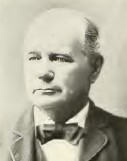 THEODORE B. SHELDON Red Wing is one of the
substantial towns of Minnesota and among its most substantial
citizens is Theodore B. Sheldon, president of the First
National Bank of that place. Mr. Sheldon located in Red Wing
forty years ago, and has been prominently identified with the
growth of the city during nearly its entire history. THEODORE B. SHELDON Red Wing is one of the
substantial towns of Minnesota and among its most substantial
citizens is Theodore B. Sheldon, president of the First
National Bank of that place. Mr. Sheldon located in Red Wing
forty years ago, and has been prominently identified with the
growth of the city during nearly its entire history.
He was born January 31, 1820, at Bernardston,
Franklin County, Massachusetts. His parents were Izatus
Sheldon, a manufacturer of boots and shoes, and Mary Pickett
(Sheldon). His ancestry, so far as he has been able to trace
it, has lived in New England. He received a common school
education, and in 1856 removed to Minnesota, settling at Red
Wing on the third of July. He has been a resident of that
place ever since. At the age of twelve years he began to work
in a woolen mill in Greenfield, Massachusetts. He continued at
that business until 1840, when he entered the employment of
John E. Russell in a cutlery factory. He remained in this
business for about three years, and then went to Springfield,
Massachusetts, where he obtained a situation in a tool and
lock manufacturing company. He remained with that company
about two years when he removed to Whitneyville, near New
Haven, Connecticut, and was employed in Whitney’s gun
manufactory on rifles, which the company had contracted to
supply the government. Two years later he removed, to Windsor,
Vermont, and was employed by Messrs. Robbins & Lawrence on
rifles to fill government contracts.
On the third of July, 1856, Mr. Sheldon arrived
at Red Wing, and in the fall of that year went into
partnership with Jesree McIntire, in the mercantile
business. The
spring of 1860 he sold his interest in the mercantile business
to his partner, and in the fall of that year built a large
warehouse and went into the grain business, in which he is
still interested.
He has also been identified with nearly all of the
important enterprises affecting Red Wing. He was appointed
agent for the Commodore Davidson Packet Company, also for the
Chicago, Milwaukee & St. Paul Railroad and for the
American Express Company. The agency of the packet company and
the railroad company he retained until the railroad was
completed from St. Paul to La Crosse, and the agency of the
American Express Company was retained by him for about
twenty-five years. Mr. Sheldon has also been interested in the
First National Bank, an institution of which he is president,
and also of the Goodhue County Bank, from the time they were
organized.
He has been interested in the Red Wing &
Trenton Transit Company, organized for the purpose of building
a road and a bridge over the Mississippi river between Red
Wing, Minnesota, and Trenton, Wisconsin. He was president of
this company and one of its directors from the time it was
formed, some fifteen years ago, until about a year ago when he
resigned. He was one of the prime movers in the Minnesota
Stoneware Company, and also in the Red Wing Gas and Electric
Light Company, the Red Wing Furniture Company and the Red
Wing, Duluth & Southern Railway Company. His business capacity
has been recognized by his election as president of all these
different enterprises. But he has not given all his time to
his private affairs.
Naturally a man of public spirit, he was called
upon to serve the city as one of the board of supervisors
under township organization, and was a member of the council
since the city was organized. In politics Mr. Sheldon is a Democrat,
and has usually voted that ticket. His church connections are
with the Episcopal church. Mr. Sheldon was married in 1848 to
Mary T. Sturtevant, of Hartland, Vermont. Five children were
born, all of whom died. Mrs. Mary Sturtevant Sheldon died in
November. 1891, and Mr. Sheldon was married again in June,
1893, in Milwaukee, Wisconsin, to Miss Annie L.
Langton.
The information
on Trails to the Past © Copyright
may be used in personal family history research, with source
citation. The pages in entirety may not be duplicated for
publication in any fashion without the permission of the
owner. Commercial use of any material on this site is not
permitted. Please respect the wishes of those who have
contributed their time and efforts to make this free site
possible.~Thank you!
|
|
|
|



